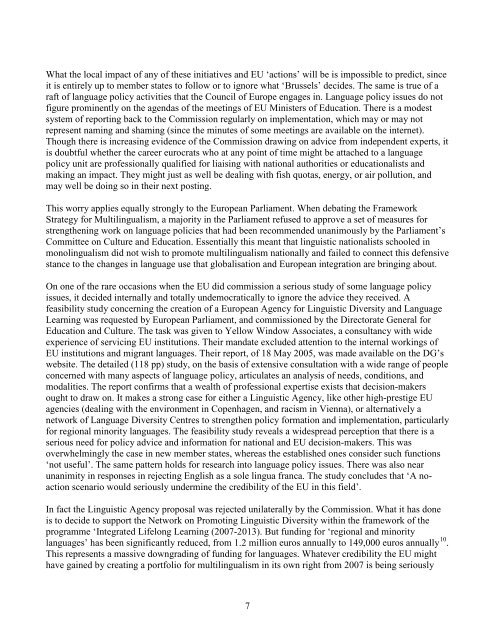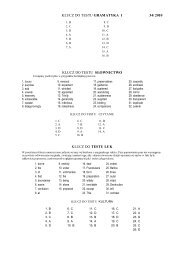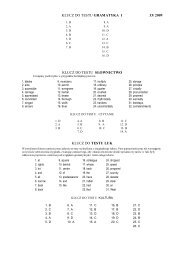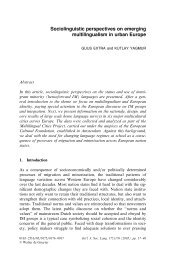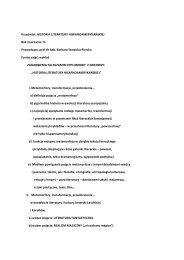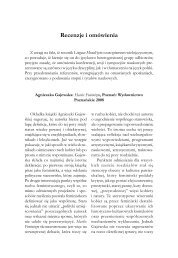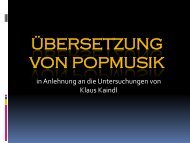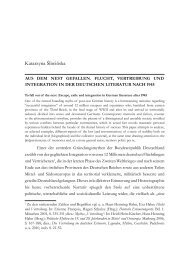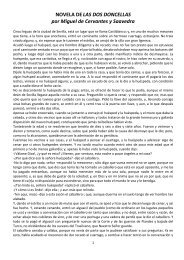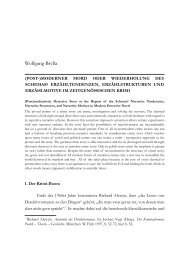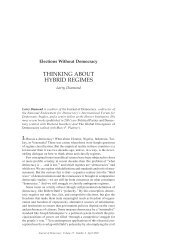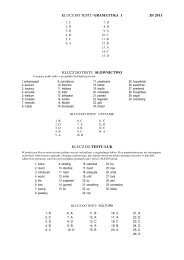R20 Phillipson 2008 English in EU lingua frankensteinia.pdf
R20 Phillipson 2008 English in EU lingua frankensteinia.pdf
R20 Phillipson 2008 English in EU lingua frankensteinia.pdf
- No tags were found...
You also want an ePaper? Increase the reach of your titles
YUMPU automatically turns print PDFs into web optimized ePapers that Google loves.
What the local impact of any of these <strong>in</strong>itiatives and <strong>EU</strong> ‘actions’ will be is impossible to predict, s<strong>in</strong>ceit is entirely up to member states to follow or to ignore what ‘Brussels’ decides. The same is true of araft of language policy activities that the Council of Europe engages <strong>in</strong>. Language policy issues do notfigure prom<strong>in</strong>ently on the agendas of the meet<strong>in</strong>gs of <strong>EU</strong> M<strong>in</strong>isters of Education. There is a modestsystem of report<strong>in</strong>g back to the Commission regularly on implementation, which may or may notrepresent nam<strong>in</strong>g and sham<strong>in</strong>g (s<strong>in</strong>ce the m<strong>in</strong>utes of some meet<strong>in</strong>gs are available on the <strong>in</strong>ternet).Though there is <strong>in</strong>creas<strong>in</strong>g evidence of the Commission draw<strong>in</strong>g on advice from <strong>in</strong>dependent experts, itis doubtful whether the career eurocrats who at any po<strong>in</strong>t of time might be attached to a languagepolicy unit are professionally qualified for liais<strong>in</strong>g with national authorities or educationalists andmak<strong>in</strong>g an impact. They might just as well be deal<strong>in</strong>g with fish quotas, energy, or air pollution, andmay well be do<strong>in</strong>g so <strong>in</strong> their next post<strong>in</strong>g.This worry applies equally strongly to the European Parliament. When debat<strong>in</strong>g the FrameworkStrategy for Multil<strong>in</strong>gualism, a majority <strong>in</strong> the Parliament refused to approve a set of measures forstrengthen<strong>in</strong>g work on language policies that had been recommended unanimously by the Parliament’sCommittee on Culture and Education. Essentially this meant that l<strong>in</strong>guistic nationalists schooled <strong>in</strong>monol<strong>in</strong>gualism did not wish to promote multil<strong>in</strong>gualism nationally and failed to connect this defensivestance to the changes <strong>in</strong> language use that globalisation and European <strong>in</strong>tegration are br<strong>in</strong>g<strong>in</strong>g about.On one of the rare occasions when the <strong>EU</strong> did commission a serious study of some language policyissues, it decided <strong>in</strong>ternally and totally undemocratically to ignore the advice they received. Afeasibility study concern<strong>in</strong>g the creation of a European Agency for L<strong>in</strong>guistic Diversity and LanguageLearn<strong>in</strong>g was requested by European Parliament, and commissioned by the Directorate General forEducation and Culture. The task was given to Yellow W<strong>in</strong>dow Associates, a consultancy with wideexperience of servic<strong>in</strong>g <strong>EU</strong> <strong>in</strong>stitutions. Their mandate excluded attention to the <strong>in</strong>ternal work<strong>in</strong>gs of<strong>EU</strong> <strong>in</strong>stitutions and migrant languages. Their report, of 18 May 2005, was made available on the DG’swebsite. The detailed (118 pp) study, on the basis of extensive consultation with a wide range of peopleconcerned with many aspects of language policy, articulates an analysis of needs, conditions, andmodalities. The report confirms that a wealth of professional expertise exists that decision-makersought to draw on. It makes a strong case for either a L<strong>in</strong>guistic Agency, like other high-prestige <strong>EU</strong>agencies (deal<strong>in</strong>g with the environment <strong>in</strong> Copenhagen, and racism <strong>in</strong> Vienna), or alternatively anetwork of Language Diversity Centres to strengthen policy formation and implementation, particularlyfor regional m<strong>in</strong>ority languages. The feasibility study reveals a widespread perception that there is aserious need for policy advice and <strong>in</strong>formation for national and <strong>EU</strong> decision-makers. This wasoverwhelm<strong>in</strong>gly the case <strong>in</strong> new member states, whereas the established ones consider such functions‘not useful’. The same pattern holds for research <strong>in</strong>to language policy issues. There was also nearunanimity <strong>in</strong> responses <strong>in</strong> reject<strong>in</strong>g <strong>English</strong> as a sole l<strong>in</strong>gua franca. The study concludes that ‘A noactionscenario would seriously underm<strong>in</strong>e the credibility of the <strong>EU</strong> <strong>in</strong> this field’.In fact the L<strong>in</strong>guistic Agency proposal was rejected unilaterally by the Commission. What it has doneis to decide to support the Network on Promot<strong>in</strong>g L<strong>in</strong>guistic Diversity with<strong>in</strong> the framework of theprogramme ‘Integrated Lifelong Learn<strong>in</strong>g (2007-2013). But fund<strong>in</strong>g for ‘regional and m<strong>in</strong>oritylanguages’ has been significantly reduced, from 1.2 million euros annually to 149,000 euros annually 10 .This represents a massive downgrad<strong>in</strong>g of fund<strong>in</strong>g for languages. Whatever credibility the <strong>EU</strong> mighthave ga<strong>in</strong>ed by creat<strong>in</strong>g a portfolio for multil<strong>in</strong>gualism <strong>in</strong> its own right from 2007 is be<strong>in</strong>g seriously7


